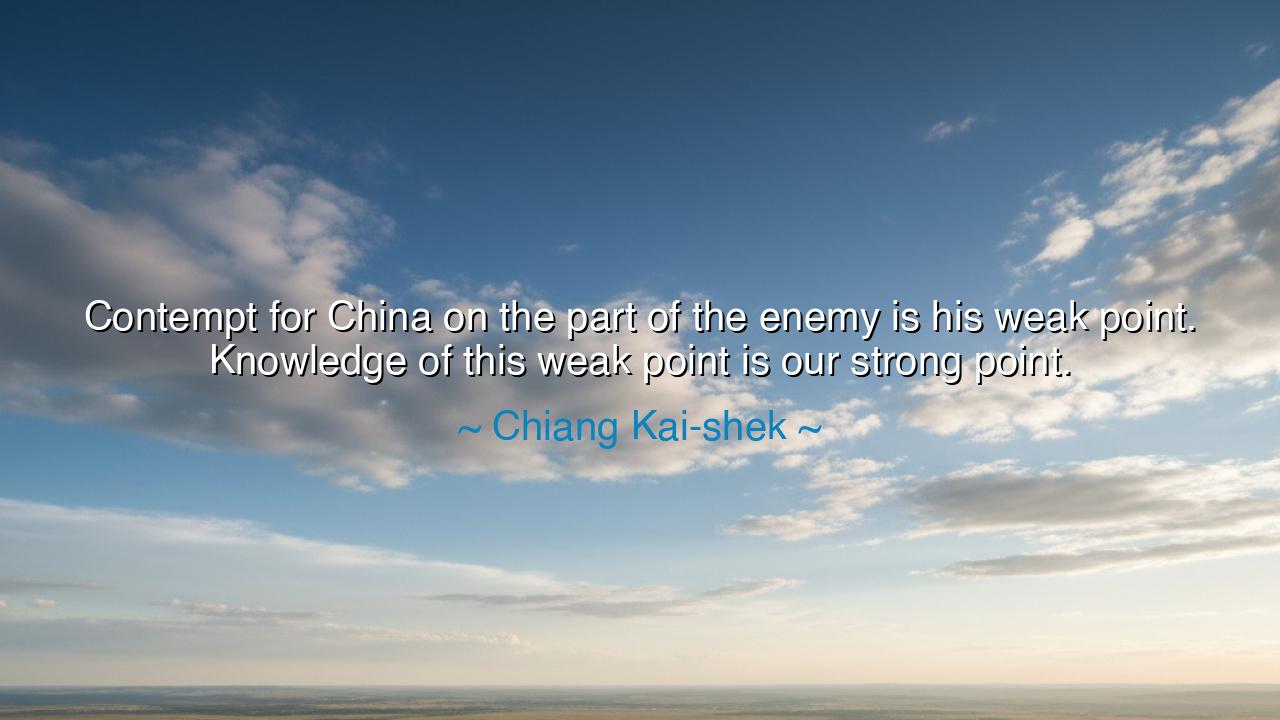
Contempt for China on the part of the enemy is his weak point.
Contempt for China on the part of the enemy is his weak point. Knowledge of this weak point is our strong point.






When Chiang Kai-shek, the soldier, statesman, and leader of a nation in turmoil, declared, “Contempt for China on the part of the enemy is his weak point. Knowledge of this weak point is our strong point,” he spoke not merely as a general, but as a philosopher of struggle. His words are drawn from the eternal rhythm of conflict — the understanding that arrogance blinds, while awareness enlightens. In this brief yet powerful statement, Chiang revealed a truth that transcends nations and centuries: when your enemy underestimates you, their scorn becomes your weapon, and their ignorance becomes your opportunity.
The origin of this quote lies within the fires of war and humiliation. China, in the early 20th century, was fractured by internal strife, colonial encroachment, and invasion. When Chiang led his people against the might of Imperial Japan and later stood against Communist revolution, he carried within him the deep memory of a nation that had been dismissed as weak, divided, and incapable of unity. The enemy’s contempt — their belief that China was too broken to resist — was precisely what gave Chiang and his forces the strength to fight with greater resolve. In every insult, they found reason to endure; in every doubt, they found the fuel of defiance.
Chiang’s words echo the ancient teachings of Sun Tzu, who wrote that “if you know the enemy and know yourself, you need not fear the result of a hundred battles.” To know the enemy’s weakness is not only to understand their flaws of strategy, but their flaws of heart. When arrogance takes root in the enemy’s mind, their vision narrows. They no longer see with clarity, but through the haze of superiority. Chiang understood that contempt breeds complacency, and complacency is the forerunner of defeat. The wise leader, therefore, welcomes the arrogance of his foes, for it blinds them to the gathering storm rising quietly beneath their notice.
In the context of China’s struggle, this was more than a military principle — it was a spiritual truth. The invaders saw a people impoverished, divided by warlords, and assumed weakness. But beneath the surface lay something invisible to foreign eyes: a river of endurance flowing through the heart of a civilization thousands of years old. The world saw famine and fragility; Chiang saw faith and memory. He knew that the soul of China could not be conquered by contempt. Thus, what the enemy called weakness was in fact resilience disguised — the patience of mountains, the quiet power of roots buried deep beneath the storms.
History has shown the wisdom of his insight. In countless battles across time, those who are underestimated have risen to greatness. When the Greeks faced the mighty Persians at Marathon, they were deemed insignificant — yet their courage shook an empire. When the Vietnamese fought against colonial forces, they too were dismissed — yet their endurance triumphed. In each case, contempt became a fatal flaw, a blindness born of pride. Chiang’s understanding was thus both national and universal: disrespect is the seed of downfall, and awareness of that disrespect transforms weakness into strength.
But Chiang’s teaching extends beyond the battlefield; it applies to all struggles of life. When others underestimate you — your capacity, your worth, your dreams — let that underestimation become your hidden advantage. Their contempt frees you from scrutiny, allowing you to grow unseen, to prepare in silence. Do not waste your energy seeking validation from those who scorn you. Instead, turn their disbelief into your discipline, their mockery into your mastery. For it is not the applause of others that determines greatness, but the persistence of purpose when no one believes.
The lesson of Chiang Kai-shek’s words, then, is one of wisdom, humility, and strategic patience. Know the strength that lies in being underestimated. Recognize that contempt is not insult alone, but information — a mirror revealing where the enemy has chosen not to look. Whether in leadership, business, or personal life, the same truth applies: arrogance destroys perception, while awareness preserves power. To know another’s blindness is to gain vision.
So let these words echo like a war drum through the generations: “Contempt is their weakness; awareness is our strength.” When the proud look down, rise quietly. When they dismiss you, refine your skill. When they mock your struggle, sharpen your purpose. For victory, whether of nations or of souls, does not belong to the loud or the arrogant — it belongs to those who, in silence and in clarity, see what others cannot see, and wait for the perfect moment to rise.






AAdministratorAdministrator
Welcome, honored guests. Please leave a comment, we will respond soon